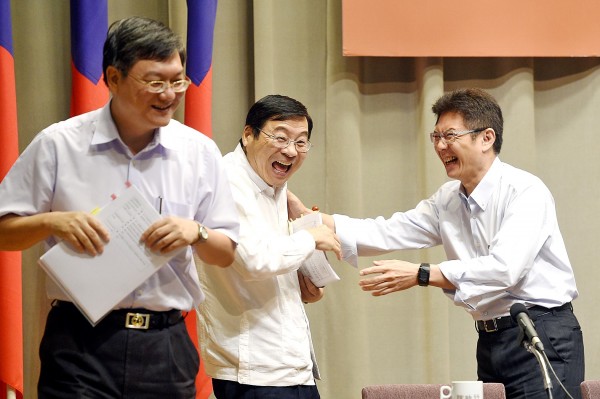《TAIPEI TIMES 焦點》 Chinese tourist cap raised by 1,000 a day

Cabinet Spokesperson Sun Lih-chyun, right, pushed Financial Supervisory Commission Chairperson William Tseng, center, as a joke, as National Development Council Minister Woody Duh, left, leaves the podium in smile after a Cabinet press conference. Photo: George Tsorng, Taipei Times
COME ONE, COME ALL: he Executive Yuan is seeking to boost tourism as the economy falters, while a travel association urged a requirement for the tourists to have insurance
By Alison Hsiao and Shelley Shan / Staff reporters
The Executive Yuan yesterday said the cap on the number of Chinese tourists traveling to Taiwan via the Free Independent Travel (FIT) program is to be raised to 5,000 a day to boost the country’s tourism.
With the GDP growth forecast for this year slashed by the Directorate-General of Budget, Accounting and Statistics (DGBAS) to 1.56 percent last week, the Cabinet said that at least four measures would be carried out to boost the nation’s tourism and service industries.
The measures include the waiving of visa fees for Southeast Asian tourist groups meeting certain conditions, encouraging Taiwanese firms to have their overseas employees travel to Taiwan, lowering the threshold for tax refunds for tourists and relaxing the cap on the number of Chinese tourists traveling via the FIT program.
National Development Council Minister Woody Duh (杜紫軍) said the changes could help the nation generate NT$8.85 billion (US$271 million) in tourism profits by the end of the year.
India, Thailand, the Philippines, Vietnam and Indonesia are the five Southeast Asian countries that could have tour groups that meet the criteria to benefit from the free-visa policy.
The threshold for visitors to claim tax refunds would be reduced from NT$3,000 (purchased from the same day and same location) to NT$2,000, and the tax-refund process would be made electronic, Duh said.
“We will ask for the assistance from the Ministry of Economic Affairs and work with domestic business groups to call on Taiwanese companies to make Taiwan the destination for employee trips for their overseas employees. These employees would not be required to pay visa fees and [if they are Chinese] would not be counted toward the yearly number allowed for Chinese tourists,” Duh said.
The cap on the number of Chinese visitors traveling via the FIT program would be raised to 5,000, from the current 4,000, a day.
“The cap on the daily number for those traveling to Taiwan via the ‘little three links’ of Kinmen and the island of Matsu would also increase [from 500 to 1,000],” the minister said.
In related news, the Travel Quality Assurance Association (TQAA) yesterday urged the government to require free independent travelers to enclose evidence of medical insurance in their application for entry permits, adding that the association is willing to assist the government in ensuring the validity of the insurance policies offered by Chinese insurance carriers.
The Tourism Bureau announced earlier this year that Chinese tourists joining tour groups arranged by travel agencies must prove that they have medical insurance before they are granted the travel permit to Taiwan, which is scheduled to take effect on Oct. 1.
However, the new policy does not apply to Chinese traveling on the FIT program, whose travel arrangements are not controlled by travel agencies.
Association secretary-general Allen Chen (陳怡全) said that Chinese tourists joining package tours arranged by travel agencies are regulated by the Tourism Bureau, while Chinese FITs are regulated directly by the National Immigration Agency (NIA).
In either one of the channels, Chen said that the travel agencies are responsible for sending in the applications for entry permits on behalf of the Chinese tourists.
“The insurance we enclose in the application only covers circumstances for which the travel agencies are liable. It does not cover when a tourist has a heart attack or has an acute episode of a chronic illness. Travel agencies need to assist the travelers in seeking medical attention, and hospitals in Taiwan cannot turn down any patients because they are not insured,” Chen said. “These Chinese tourists do not necessarily carry enough cash to pay for medical costs either. Collecting unpaid medical bills puts a huge burden on the travel agencies, the Chinese tourists and the medical institutions in Taiwan. We hope that the requirement for medical insurance for Chinese tourists to address this issue.”
However, he said that the NIA has been rejecting the requirement, saying it does not have sufficient staff to ascertain the validity of the insurance policies presented by Chinese tourists.
“We [the association] are willing to be the agency to validate the insurance policies. If nobody does this, our members of the association, which are large travel agencies in Taiwan, would end up paying for losses,” Chen said.
The Tourism Bureau said that the NIA would monitor the situation with the Chinese tourists traveling with tour groups and would consider applying the same policy to Chinese FITs.
新聞來源:TAIPEI TIMES

















